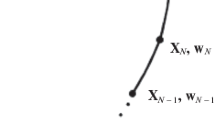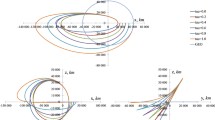Abstract
An indirect approach to the optimization of trajectories with finite thrust based on Pontryagin’s maximum principle is discussed. The optimization is aimed at calculating the minimum thrust for a point-to-point flight completed within a given interval of time with a constant exhaust velocity and a constant power. This may help calculate the region of existence of the optimum trajectory with thrust switching: it is evident that the latter problem may be solved if minimum thrust is lower than or equal to the available thrust in the problem with switching. A technique for calculating the optimum trajectories with a finite thrust by solving the problem of minimization of the thrust acceleration with a subsequent numerical continuation with respect to the mass flow towards the thrust minimization problem is proposed. This technique offers an opportunity to detect degeneracies associated with the lack of thrust or specific impulse. In effect, it allows one to calculate the boundaries of the region of existence of trajectories with thrust switching and thus makes it possible to automate the process of solving the problem of optimization of trajectories with thrust switching.
Similar content being viewed by others
References
Petukhov V.G., One numerical method to calculate optimal power-limited trajectories, Proc. 24th IEPC, Moscow, 1995, pp. 1474–1480.
Eneev T.M., Egorov V.A., Efimov G.B., et al., Some methodical problems of low-thrust trajectory optimization, Preprint of Keldysh Inst. of Applied Mathematics, Moscow, 1996, no. 110.
Petukhov V.G., Konstantinov M.S., and Fedotov G.G., 1st ACT global trajectory optimisation competition: results found at Moscow Aviation Institute and Khrunichev State Research and Production Space Center, Acta Astronaut., 2007, vol. 61, no. 9, pp. 775–785.
Petukhov V.G., Optimization of interplanetary trajectories for spacecraft with ideally regulated engines using the continuation method, Cosmic Res., 2008, vol. 46, no. 3, pp. 219–232.
Petukhov V.G., Method of continuation for optimization of interplanetary low-thrust trajectories, Cosmic Res., 2012, vol. 50, no. 3, pp. 249–261.
Petukhov V.G., Minimum-thrust problem and its application to trajectory optimization with thrust switchings, Proc. 64th IAC, Beijing, 2013.
Lyness J.N. and Moller C.B., Numerical differentiation of analytic functions, SIAM J. Numer. Anal., 1967, vol. 4, no. 2, pp. 202–210.
Lyness J.N., Numerical algorithms based on the theory of complex variables, Proc. 22nd ACM National Conference (New York, 1967), Washington: Thompson Book Company, 1967, pp. 124–134.
Squire W. and Trapp G., Using complex variables to estimate derivatives of real functions, SIAM Rev., 1998, vol. 40, no. 1, pp. 110–112.
Author information
Authors and Affiliations
Corresponding author
Additional information
Original Russian Text © A.V. Ivanyukhin, V.G. Petukhov, 2015, published in Kosmicheskie Issledovaniya, 2015, Vol. 53, No. 4, pp. 320–331.
Rights and permissions
About this article
Cite this article
Ivanyukhin, A.V., Petukhov, V.G. The thrust minimization problem and its applications. Cosmic Res 53, 300–310 (2015). https://doi.org/10.1134/S0010952515040048
Received:
Published:
Issue Date:
DOI: https://doi.org/10.1134/S0010952515040048




